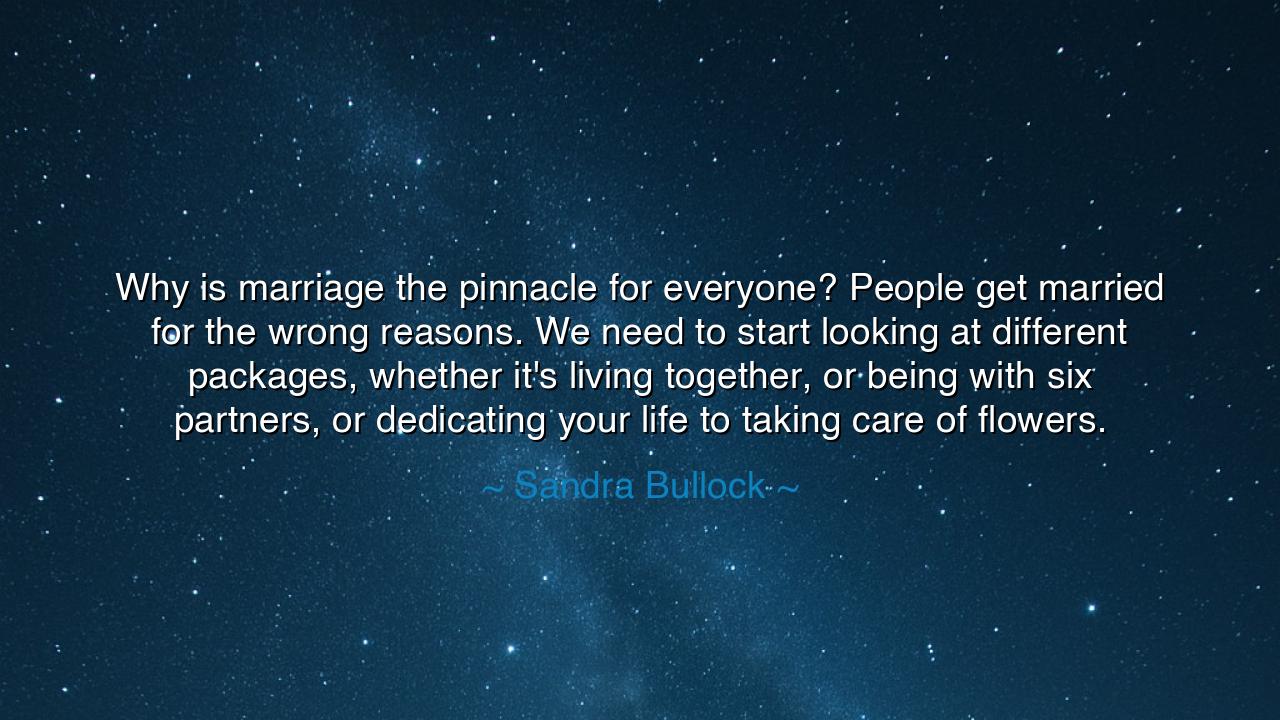
Why is marriage the pinnacle for everyone? People get married for
Why is marriage the pinnacle for everyone? People get married for the wrong reasons. We need to start looking at different packages, whether it's living together, or being with six partners, or dedicating your life to taking care of flowers.






Hear, O seeker of truth, the bold words of Sandra Bullock, who asked without fear: “Why is marriage the pinnacle for everyone? People get married for the wrong reasons. We need to start looking at different packages, whether it’s living together, or being with six partners, or dedicating your life to taking care of flowers.” In this utterance she challenges the ancient idol of custom, the belief that one path—marriage—is the summit of all human fulfillment. Her voice calls us to awaken, to recognize that human lives are as varied as the stars in heaven, and that no single mold can contain the fullness of human longing.
For centuries, society has enthroned marriage as the pinnacle, the highest and most honorable achievement of personal life. Men were told their worth was measured by their households, women by their husbands, and together by their children. Yet Bullock unmasks the truth: many enter this covenant not from love or calling, but from expectation, pressure, and fear of being left behind. In such cases, marriage ceases to be a bond of joy and becomes a burden, a gilded cage in which two souls wither.
She warns that “people get married for the wrong reasons.” History is filled with such tales. Think of the royal unions of Europe, where kings and queens wed not for affection but for alliances, for property, for power. The marriages of these crowned heads often bore little harmony, sometimes even hatred, and yet they endured for the sake of appearances. The lesson is clear: when marriage is pursued as an obligation or as a symbol of status, it may secure the body but rarely nourishes the heart.
Bullock dares to envision “different packages” of living. To dwell together without formal vows, to embrace unconventional unions, to dedicate oneself wholly to art, to creation, even to the tending of flowers—these she names as valid and beautiful paths. Her words echo the wisdom of many ancient teachers who reminded us that the good life is not a single road but many. Some find fulfillment in companionship, others in solitude, others still in service or creativity. Each soul must discern its own calling, for the garden of humanity is richest when it contains many flowers, not one.
Consider the life of Henry David Thoreau, who never married but dedicated his days to nature, solitude, and writing at Walden Pond. His works, born of his devotion to a life outside the expected mold, became treasures for generations. He shows us that one may reject the “pinnacle” of marriage and yet live a life of deep meaning and influence. Such examples reveal the truth of Bullock’s words: there is not one way to live rightly, but many, and the worth of a life is not measured by conformity, but by authenticity.
O children of tomorrow, learn this: do not rush toward marriage simply because the world tells you it is the ultimate prize. Ask yourself instead: what is my true path? Is it to walk with another, or to walk alone? Is it to raise children, or to raise ideas? Is it to build a family, or to build beauty in the world through art, service, or creation? To choose differently is not failure; it is courage.
What then must you do? Listen to the stillness within your heart. Choose relationships, covenants, and paths of living that spring from love and purpose, not from fear or pressure. Honor those who choose marriage, but honor also those who choose otherwise, for diversity of paths enriches the whole of humanity. And when you encounter others who live differently from you, do not condemn, but learn, for every life lived authentically reveals a new facet of human truth.
Thus, Bullock’s words, though spoken with simplicity, carry a revolutionary spirit. They remind us that marriage is not the pinnacle for everyone, and that freedom, creativity, and authenticity must be honored as much as tradition. Let this teaching guide you: live not by the molds of others, but by the truth of your soul. For in the end, the greatest “pinnacle” is not a title, a vow, or a role—it is to live fully as who you are meant to be.






AAdministratorAdministrator
Welcome, honored guests. Please leave a comment, we will respond soon